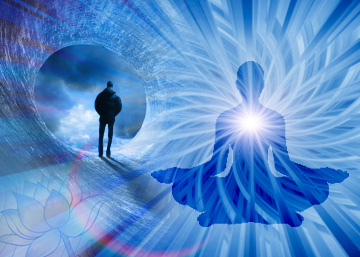The Meaning of Change
An integral perspective on the meaning of change.
In our modern world especially in the corporate world there is a constant clamour for “change.” Corporate pundits proclaim, “Change is the only constant” and therefore to survive or prosper we have to adapt or move with this change. The other psychological factor behind this clamour for change is that our human vital, seeks for novelty and change for its own sake.
Most of these corporate notions of change are incomplete half-truths. Change is undoubtedly an inherent characteristic of life. But change is not the “only constant”. There is an unchanging spirit and an immutable silence behind Nature’s change. There is a purpose, plan and design behind Nature’s change. There are some enduring values that belong to the higher nature of human being which are the foundations of lasting well-being. And finally in Nature, change is not for the sake of change but a forward movement. There is an evolutionary movement in Nature. This may not be a linear progress but a cyclical movement where various parts of the human being or elements of human potential are awakened, brought-forward and developed in different epochs, civilisations or phases of the historical evolution, according to a wisdom that transcends human logic and reason.
Towards a Holistic Change
Change cannot be an end in itself or for its own sake; it has to be a progressive and creative change which leads to a better human being and a better world. Ancient culture stressed on inner change and progress in the mental, moral and spiritual domain. The modern secular culture emphasises on outer change and progress in the economic, social and political domains. Both are needed for the integral fulfillment of human life. An exclusive stress on inner change and progress leads to a stagnant society, which ultimately degenerates into casteism or feudalism. Inner change has to manifest itself in the outer life in terms of greater harmony, well-being, liberty, equality and fraternity in the community. On the other hand, too heavy emphasis on outer change and progress leads to a different kind of degeneration in the moral, aesthetic and spiritual domains.
Outer change and progress have to be balanced by a corresponding inner change and progress. The fruits of outer progress in the form of increased wealth or better technology have to be used to create an outer organisation which provides sufficient opportunities, incentives and facilities for people to pursue their inner growth.
The corporate world views change in terms of constant improvement in efficiency, productivity, economy or market-share; seizing of opportunities; satisfying the changing needs of the customer or the environment; new products, method or process through innovation. All these are well and good. But, if these things are pursued exclusively it can only create increasing stress, tension and degeneration. For a wholesome and healthy change, which leads to lasting well-being the following condition have to be fulfilled:
1. Bring in factors of stability like inner peace and enduring values.
2. As we have indicated earlier, outer change has to be balanced by an inner change which comes from a progressive manifestation of our higher nature made of our mental, moral, aesthetic and spiritual being and its values like truth, beauty, goodness, harmony, unity. These values have to be lived not only in behaviour and action but internalized in our consciousness by elimination of all that is hostile or contrary to these values and cultivating all that are in harmony with it in our thought, feelings, motives and sensations.
3. An intuitive comprehension of the forward movement of nature, understanding of the possibilities and potentialities which the evolutionary Nature is pushing to manifest and a strategy of change-management based on this understanding.
4. Building an outer environment, organisational, social and cultural, which encourages and supports the above factors and provides sufficient opportunities and the education to people to progress in this direction.
M.S. Srinivasan
The author is a Research Associate at Sri Aurobindo Society and on the editorial board of Fourth Dimension Inc. His major areas of interest are Management and Indian Culture.

